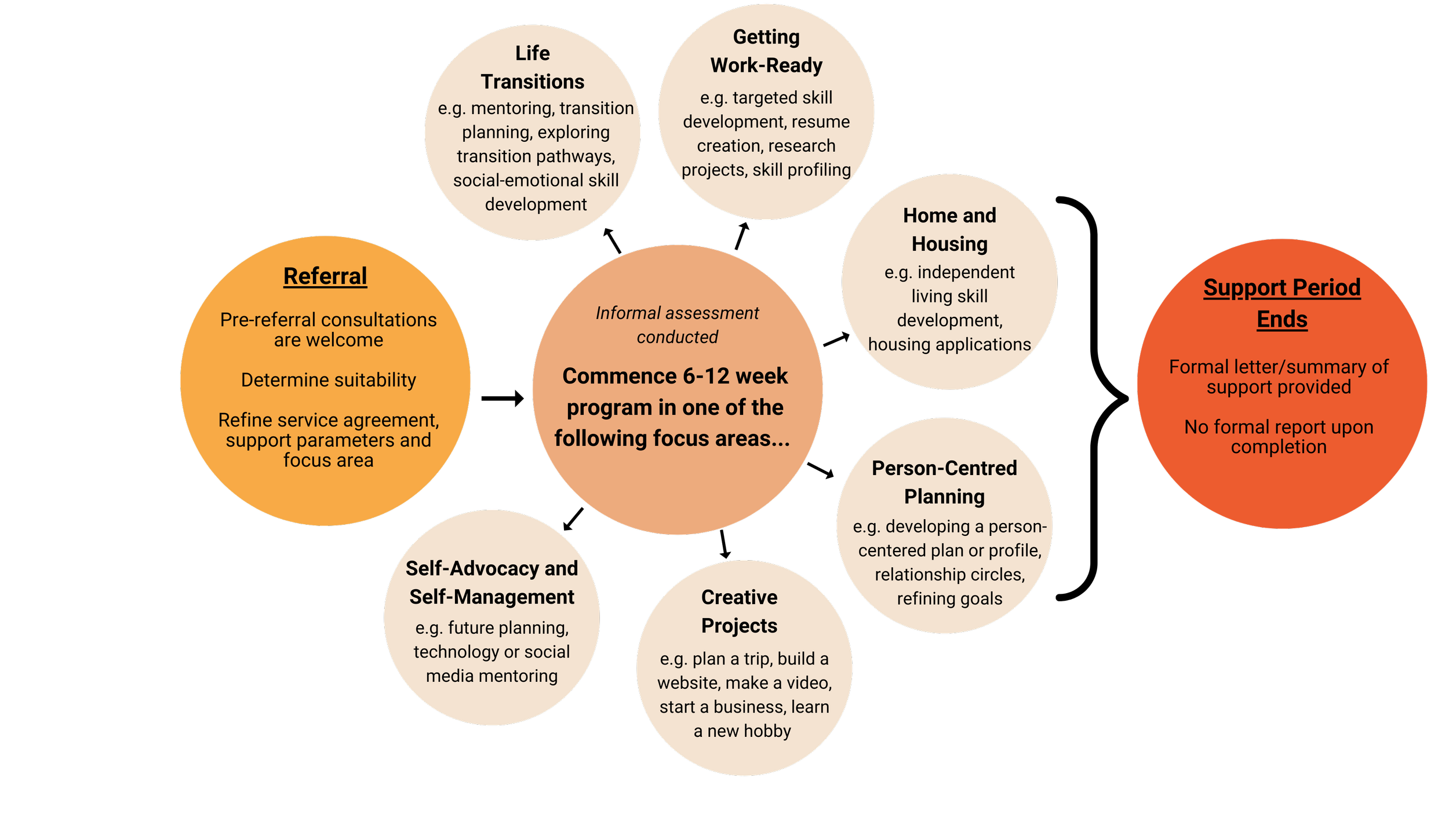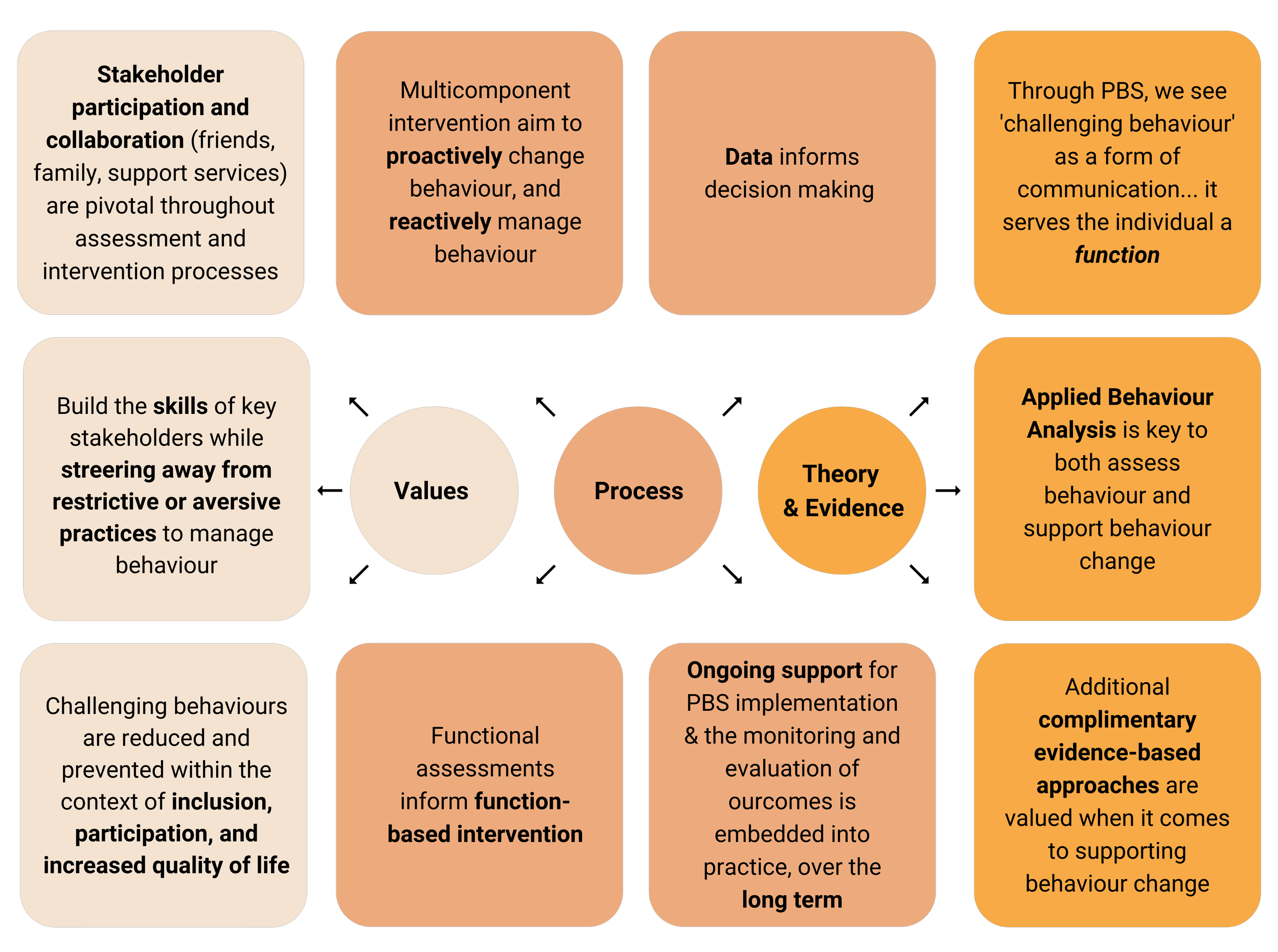Services
Developmental Education (DE): Assessment, Therapy, Training
Working therapeutically alongside people with disability to build self-advocacy and life skills that support participation and quality of life.
Recreational Therapy
Short-term or ongoing therapeutic support with a specific focus on leisure and recreation.
Positive Behaviour Support
Support that aims to reduce challenging behaviour while increasing quality of life and promoting skill development.
Targeted Capacity Building Programs
Short-term, intensive mentoring and skill-development programs in one of our specific focus areas.
Developmental Education
What is a Developmental Educator (DE)?
Developmental Educators are multi-disciplinary disability specialists with expertise in fostering the skills, independence and quality of life of individuals with developmental and/or acquired disabilities. Developmental Educators (also referred to as DE’s) have a practical approach and work holistically across the life span to address issues which may affect the function, independence and social inclusion of individuals with disability, their families and carers.
Green Ant’s DE Therapeutic Support Process
-
Let’s chat! Pre-referral consultations are encouraged and welcome.
DE support is versatile and adaptive. If you have a specific goal or are looking to build skills in a particular area of your life, we can design an intervention program to suit your needs.
-
DE’s are NDIS approved allied health professionals providing therapeutic support and intervention to people with disability across Australia. As per the NDIS Price Guide, DE supports are typically charged under the ‘CB Daily Living’ category.
The specific ‘item number for this support is:
15_613_0128_1_3 - Assessment, Recommendation, Therapy or Training - Developmental EducatorAs at January 2023, Green Ants prices for therapeutic support reflect the following:
$260.00 per hour in ‘very remote’ settings (East Arnhem)
$175.00 per hour in metropolitan NT areas (Darwin or via telehealth)
The prices above are approximately 10% lower than the current NDIS price guide.
Green Ant is currently not a registered NDIS provider. This means that only participants who are ‘plan managed’ or ‘self managed’ can access our therapeutic services.
-
In order to provide DE services to NDIS participants, DE’s must be registered with Developmental Educators Australia Inc. (‘The DEAI’).
The DEAI’s website hosts a broad range of resources that promote the work that DE’s undertake:
https://www.deai.com.au/developmental-educators-and-the-national-disability-insurance-scheme -
Yes! DE’s are recognised by the NDIA as allied health professionals. There is a ‘DE’ line item in the NDIS Price Guide under ‘Improved Daily Living’. If you are in need of an Assessment and Recommendations Report to support an appeal or a review, this can be undertaken without having completed sessions. DE’s can complete behavioural, functional capacity, sensory, and developmental assessments.
As always, Green Ant will determine whether we are best placed to undertake this assessment before accepting the referral. If not, we will support you with a referral elsewhere.
Targeted Capacity Building Programs
Green Ant offers short-term, intensive capacity building programs for individuals who require coaching, mentoring or skill-development in one of the below focus areas.
Life Transitions
Getting Work Ready
Home and Housing
Person-Centred Planning
Creative Projects
Self-Advocacy & Self-Management
Green Ant’s Short-Term Programs: Process
-
This support is most appropriate for:
People looking for a more intensive, short-term skill-development program in a specific focus area
People with a very specific goal, project or hurdle to overcome
People not requiring or seeking any formal assessment or review and recommendations report
-
Together we will decide how long a program will go for, however short-term programs are designed to run for between 6-12 weeks. The length and intensity of a program will depend on:
what you are wanting to achieve within the program
your funding arrangement, and how much you would like to invest into the program
the support structure that we decide on
both parties availability
-
Together we will reflect on what was achieved over the program period. You will receive a letter outlining this. You may decide to continue support, either on the same focus area or on another.
-
As this support is being provided by a DE, and the nature of it is therapeutic, this support is most commonly billed under ‘CB Daily Living’. Your CB Daily Living funding is flexible, unless there are ‘stated’ line items in your plan.
There are additional NDIS funding categories which may enable you to access this support outside of CB Daily Living funding. These include:
13_030_0102_4_3: Transition through School and to Further Education
11_024_0117_7_3; individual Social Skills Development
10_016_0102_5_3: Employment Support
09_009_0117_6_3: Skills Development and Training
09_006_0106_6_3: Life Transition Planning, Including Mentoring, Peer-Support And Individual Skill Developmen
08_005_0106_2_3: Assistance with Accommodation and Tenancy Obligations
Quotes for our short-term programs are individualised and vary depending on the hours and structure of support that is decided on.
The fees per hour are reduced, to enable more intensive support through the program. The fees per hour of support under this category are at $150 per hour.
Note: Green Ant is currently not a registered NDIS provider. This means that only participants who are ‘plan managed’ or ‘self managed’ can access our therapeutic services.
Positive Behaviour Support (PBS)
What is Positive Behaviour Support?
Positive Behaviour Support (PBS) is a widely endorsed response to support people with cognitive disability who use ‘challenging behaviours’. Some examples of challenging behaviours might include physical or verbal aggression, self-harm, property damage or inappropriate sexualised behaviours. Through a PBS lens, we see such behaviours as:
‘Challenging’, because they create challenges in an individual’s life in areas of relationships, safety and wellbeing, inclusion, participation, learning and development
‘Challenging’, because they challenge the systems around an individual, often resulting in harm to the individual or those around them
‘Challenging’, because they are widely misinterpreted and misunderstood, despite often serving a purpose for the individual and a way to communicate their needs
Key Components of PBS
What does PBS in the NDIS look like?
Like any NDIS support, PBS is an individualised support and looks different for everybody. It should however, reflect the ‘key components’ in the diagram of this page, and usually includes:
The use of Functional Behaviour Assessment(s), along with other assessments to better understand the context(s) in which such behaviours are occurring
The use of various data collection methods and data analysis to inform decision-making
The development of a Positive Behaviour Support Plan, entailing proactive, preventative, reactive, and response strategies to reduce and manage challenging behaviours
Implementation support, to bring the Behaviour Support Plan to life through collaboration with the individuals support networks across settings
An ongoing focus on skill development, for both the individual at the centre and their support team
An overarching (and arguably primary) focus on enhancing quality of life for the individual at the centre
Oversight and ongoing intervention designed to reduce the use of restrictive practices
What is a Behaviour Practitioner?
Through the NDIS, PBS can only be provided by a registered ‘Behaviour Practitioner’. Behaviour Practitioners are registered with the NDIS Quality and Safeguards Commission to provide specialist behaviour intervention and support for NDIS participants. The aim of this role is to both enhance the quality of life of clients, and to reduce challenging behaviour through non-aversive, data-driven and person-centred interventions. Behaviour Practitioners are required to undertake regular supervision, meet minimum registration standards and participate in a high level of ongoing professional development.
Who can access PBS?
The provision of PBS is highly regulated within the NDIS. Only participants who have funding in the ‘CB Improved Relationships’ category can access this support. If you are aware of an individual who does not have this funding but may require it, it is advised that you gather as much evidence as possible to support this request and lodge a review with the NDIA. Don’t hesitate to call the NDIS Quality and Safeguards Commission or the NDIA if you have further questions on this process. Green Ant can provide advice around gathering this information, or can support with a Behavioural Assessments.












